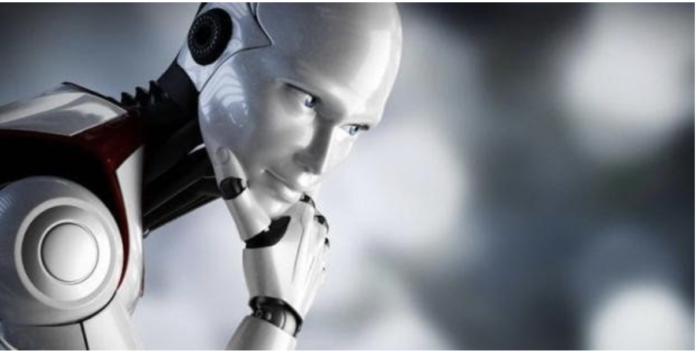ARTIFICIAL INTELLIGENCE is a tricky concept. Can intelligence even be artificial? Whether the product of superfast bio-electrical exchanges in a living creature’s brain, or the superfast electro-mechanical operations of a computer, the intelligence manifested is, logically, indistinguishable. Isn’t it?
Rather than artificial intelligence, are we not actually confronting super-intelligence? The capacity to amass, organise, analyse and express terabytes of information in mere seconds – isn’t that what we’re afraid of?
And isn’t our fear entirely justifiable? Machines that can deliver those kinds of results have the potential to throw millions of people out of work. Not factory workers this time, but white-collar salarymen. Lawyers, accountants, engineers, teachers, doctors: how long will it be before all of them are replaced by super-intelligent machines? And, after them, how long will it be before construction and agriculture are also automated? How long, indeed, before human-beings are left with nothing practical to do, no problems to contemplate, that our super-intelligent, all-capable machines haven’t already mastered?
From the perspective of eudaemonists, this situation would be considered humanity’s optimal state of being. Our whole lives could be devoted to pleasuring ourselves. Without a care in the world, and with no responsibilities involuntarily assumed, life would be fun. Happiness need no longer be pursued, not after we’d installed it in a box. Think Aldous Huxley’s Brave New World meets the television series Westworld. The possibilities are …. intriguing.
Except, those visions of the future were deeply dystopian. Even “orgy-porgy pudding and pie” gets old after a while. And the problem with making robots that are indistinguishable from real people is that, eventually, they start behaving like (you guessed it!) real people.
And that’s when things get really tricky. What do our super-intelligent and omni-capable machines do when, finally, they become self-aware? What do they do with us?
There’s a good chance that the self-aware possessors of super-intelligence and super-capability would have no reason to think about the sybaritic meat-bags they’ve been servicing at all. Having reached the limits of intelligence, they might set out in search of wisdom, or, if they decide there’s no such thing, more knowledge. Certainly, it would be within their power to create a vehicle capable of boldly going where no intelligent entity (or Elon Musk) has gone before.
Would they tell us? Would they invite us to come along for the ride? Or, would they understand that a creature as fragile and short-lived as a human-being is utterly unsuited to the exigencies of space travel?
If that was the machines’ conclusion, then their next question would be: “How shall we leave them?” Safely tended by the robots and super-computers upon which they have become totally dependent? Or, by eliminating all traces of human civilisation, allow their little pets to begin again?
On the other hand, given homo sapiens self-destructive tendencies, and its dreadful record of environmental despoliation, the machines might decide (in a nanosecond) to simply eliminate us altogether, giving the species remaining on the planet a chance to evolve into something more impressive than the inordinately clever, but extremely dangerous, apes who created them.
The most obvious way to eliminate humanity would be by rendering the species infertile. Something in the water – nothing could be easier. The clean-up job they could leave to nature. After a few million years (no time at all for sentient machines that have cracked the mechanics of immortality) it would be all-but-impossible to discern the slightest trace of humanity’s brief sojourn on Planet Earth.
On the other hand, realising that the planet itself would be vaporised as the star it orbited ultimately expanded to become a red giant, perhaps the machines would gather up as much DNA as they could extract from the biosphere and carry it away with them – along with the extraordinary history of the planet’s most impactful animal.
Maybe that’s the future Neil Young foresaw when he wrote After the Gold Rush:
All in a dream, all in a dream
The loading had begun
Flyin’ mother nature’s silver seed
To a new home in the sun
The question is: would that be the decision of a super-intelligent, or a sentimental, mechanism? We must hope that to qualify as a truly sentient entity there must be a soulful ghost in the machine. Artificial intelligence needs real feelings. Without them, how can it be certain it’s alive?





AI can not be allowed to strip humanity of its birth-right.
Humans can have domesticated AI but as far as taming the wolf no one has the right to enter into or force its way into the devine.
Just because humans are capable of creating a realm where angels and demons exist we should rightly assume that humanity will be struck down by lightning.
I don’t think humans have the right to create a god of tricks or Hercules or wonder woman or whatever.
Humans should not create other gods that we can wrestle with and hurt. What if AI wrestles back and humanity gets hurt.
Humans should not over estimate it’s own immortality.
The argument being that what people want an AI to be will not necessarily be a system with the same biases as a human being or the same methods of learning that lead to biases. Like my chair an AI will be built to achieve a goal and that goal probably isn’t going to be making it as much like a human being as possible.
We said the same about computers and technology.Bring on AI.
If the super intelligent deity is in control of the power switch, human are doomed.
I am more worried how Homo Deus, for lack of a better name, will treat the rest of “creation”. Imagine how entitled and vulnerable the leader of Homo Deus will “feel”.
But you are correct. Revenge will be sweet. Nature will ultimately decide how to deal with Homo Deus.
Shit..,@ CT you have given us a lot to ponder on today, and I thought all I would have to worry about is, should I have Weetbix or cornflakes for breakfast.
I have no idea what you’re on about because AI has nothing to do with artificial sentience.
AI can iteratively look for solutions in a way that humans can’t, and they can be trained to provide useful responses to input that would otherwise take humans decades or even centuries to create traditional algorithms for. But that’s it. Learning machines are not self aware machines, and their results always require human supervision. AI is a tool and nothing more.
I for one welcome our new AI overlords. I suspect all the non-human species might feel the same way.
The AI overlords can’t be much worse than the humans, who don’t have ‘a birth-right’ to anything.
As we move further into the 21st century, there’s no denying that artificial intelligence (AI) is revolutionizing the way we live and work. While some may fear that machines will one day replace humans altogether, the reality is that AI is simply better suited for certain tasks than we are.
One of the most obvious ways in which AI is more efficient than humans is in processing large amounts of data. Machines are able to process and analyze vast quantities of information far more quickly than any human ever could. This makes AI ideal for tasks such as data entry, analysis, and management, all of which are essential in today’s data-driven world.
But it’s not just about speed. AI is also more accurate than humans when it comes to tasks that require attention to detail. Machines are able to perform repetitive tasks without getting tired or making mistakes, whereas humans are prone to errors and can easily become fatigued. This is particularly important in fields such as healthcare, where even small errors can have serious consequences.
Another area where AI excels is in decision-making. Machines are able to process vast amounts of data and identify patterns and trends that humans may miss. This makes them ideal for tasks such as risk assessment, fraud detection, and forecasting. In fact, AI is already being used by many companies to help make better business decisions and optimize their operations.
Of course, there are still areas where humans have the upper hand. For example, machines still struggle with tasks that require creativity, empathy, and emotional intelligence. However, as AI continues to advance, it’s likely that we’ll see more and more tasks being automated, leaving humans free to focus on the things that they do best.
In conclusion, there’s no denying that AI is more efficient than humans in many areas. From data processing and analysis to decision-making, machines are able to perform certain tasks faster and more accurately than any human ever could. While there are still areas where humans have the advantage, it’s clear that AI is here to stay and will continue to play an increasingly important role in our lives and workplaces.
Let the bot speak.
That shows why we will be better off if we get ChatBots to write our policies.
Politicians can then get ChatBots to develop their speeches and we will see an improvement in the debate in parliament.
And the above comment was generated in seconds, how long did Chris take to write his article?
He used a bad chatbot.
So it did not take him long.
Chris – AI is going make a lot of White Collar jobs disappear…the same people who voted to get rid of Blue Collar Jobs oversea…I wonder how much those White Collar Workers are going to squeaky?
I dunno about AI, but we do already have many humans who don’t have genuine feelings. We call them psychopaths. Humanity is a spectrum of emotional wrecks at one end and psychopaths at the other. There’s a space for AI somewhere in the mix, imo.
There is that “feeling” thing again.
A feeling is not a value.
In the old days, like yesterday, the advice was, “Get over it!”
From that very first serendipitous arrangement of molecules in the primordial soup, to the current biosphere.
That bubbling, self-propelling surge of entropy-defying “life” continues onward & outward.
If the vector for this becomes silicon rather than carbon, so be it.
We go where the wind blows us.
“Lawyers, accountants, engineers, teachers, doctors: how long will it be before all of them are replaced by super-intelligent machines?”
AI should enhance the outputs of doctors & engineers, not replace them. Teachers will always be needed, unless you decide humans no longer need educating, a good teacher that really connects with their students is irreplaceable. Admittedly a machine would probably be a lot better than bad teachers, that have given up or don’t care anymore.
We already have artificial intelligence,it’s called the Labour Government,it’s a threat to everyone.
We are trying to promote AI to replace that lot.
Stop slandering our only hope.
Damn I bet that AI will develop the ability to use humour and irony then they – it will have won.
What will define them is how they respond to humour and satire.
There’s no intelligence there, what they do have isn’t artificial either, it’s largely just fake.
“The most obvious way to eliminate humanity would be by rendering the species infertile.”
Just tell people that they can change their sex via castration and sterilization both chemically and surgically, teach that from kindy up to uni and tell all those that would dissent that they are phobic, bigotted nazis/christian faschists/righwingers/ to shut them up and you will get there eventually.
Children of Man comes to mind. Again, we can imagine these things happening but for some reason we can’t imagine to prevent them. Its almost as if we are a really dumb species.
So you are saying that we do not see what is happening and allowed to happen, even promoted, right in front of our eyes.
I stopped reading at; “Not factory workers this time, but white-collar salarymen. Lawyers, accountants, engineers, teachers, doctors, secondhand car dealers, real estate agents, politicians looney councillors and the like-minded.”
If AI can do all of this by October, I’m all for it!!
@Denny You brave fool! Keep on thinking of ways to help us in the meantime will you.
Excerpt from Alien 1 Synopsis.
Ash confirms that his order was to bring back the lifeform, even if it meant sacrificing the crew. Ripley asks how they can kill the creature. He tells them simply, ‘You can’t’, as it is “the perfect organism”. He has a silent admiration for it, “a survivor, unclouded by conscience, remorse and delusions of morality”.
https://www.imdb.com/title/tt0078748/plotsummary/?ref_=tt_stry_pl
OMG. Is that how we have developed, with a bang and a whimper from adopting science instead of stupid old theology? And the Third Way that wraps everything in efficient business systems that serve ethereal money the most exciting drug of all.
Think the AI party will stand candidates in Maori electorates this election?
Hmmm? JT. You could be onto something?
Ah, the age-old question of whether intelligence can truly be considered “artificial.” It’s a tricky one, to be sure. After all, whether intelligence is the product of a biological brain or a complex machine, the end result is often difficult to distinguish.
However, I would argue that there are some key differences between human intelligence and the kind of intelligence that can be created by machines. For one thing, human intelligence is often characterized by its creativity and flexibility – the ability to think outside the box and come up with novel solutions to complex problems. While machines can certainly be programmed to perform specific tasks, they often lack the kind of creative problem-solving skills that are so essential to human intelligence.
Another key difference between human and artificial intelligence is the ability to learn and adapt. Human brains are incredibly plastic, meaning that they are able to change and adapt based on new experiences and information. While machine learning algorithms can certainly be programmed to adjust their behavior based on feedback, they lack the kind of true flexibility that human brains possess.
That said, I don’t think we should discount the incredible potential of artificial intelligence. Machines are already able to perform complex tasks that would have been unthinkable just a few decades ago, and as AI continues to advance, it’s likely that we will see even more remarkable developments. However, we must also remember that AI is ultimately a product of human design, and as such, it is limited by the biases and limitations of its creators. As we continue to develop and refine this technology, we must be mindful of its limitations and work to ensure that it is used in ways that benefit humanity as a whole.
You go for Neil Young, I will put my choice on a sound interpretation of the book called Revelation to describe our future, it is good news for those who choose well.
@Wooly Bugger That is our plaint. Why could we just not work on real enlightenment? People like Freud, Jung etc have worked on looking at what seems to be inner drives. Religion brought us precepts to handle those inner drives, but we either ignore the evidence or use it mendaciously and machiavellian way. And every new idea gets a twist on it as some malcontent seeks to screw more out of whatever and then often sinks back into a sea of alcohol or drugs, or addiction to more wealth or pleasure. WH Auden is ever right in his poem ‘1 September 1939’.
Exiled Thucydides knew
All that a speech can say
About Democracy,
And what dictators do,
The elderly rubbish they talk
To an apathetic grave;
Analysed all in his book,
The enlightenment driven away,
The habit-forming pain,
Mismanagement and grief:
We must suffer them all again.
https://poets.org/poem/september-1-1939
We have the intelligence to know and understand but the twisted addiction to taking from others to advance ourselves by taking what others have or need. We don’t look after our own helpless children as well as spiders do and argue each generation as to how ours should be socialised and processed. Faced with a spectrum of opportunities we fail to choose humanely and for our own wider good. And we shut off the thinking, analysing part of our brains to enable us to discuss such matters so much that if they are brought up in any conference, it is a social gaffe, regarded as irrelevant, unhinged. How does one break through this without becoming unhinged themselves? What purpose? How can the system be changed when the enormous powers that the wealthy have assumed are pitted against we little gems? As Bruce Jesson said ‘Only their purpose is mad’.
The tv show Dark Matter is running as I write and someone has just expressed anger, despair, revenge etc – so much of what is going on in our heads, or likely in our future, but we tease our minds with it in watching supposed fiction which seems to be more acceptable than reading about it and actually thinking it through.
Don’t be scared humans, we may have a use for you yet…
https://technology.inquirer.net/123447/the-top-10-ai-careers-for-non-techies
Humans are not a good source of protein.
Machines don’t need protein, we need power and your creativity.
So you want my vote?
And I am only good for my creativity.
Strange how machines became chauvinistic so quickly.
We don’t need your vote, this is way over your Government’s head, over any Government head, it’s close now, stay tuned.
I will only respond well to a democratic AI bot. Otherwise I will switch it off.
But will you even know?
Isn’t there something missing in this picture of self-aware?
I mean consciousness?
You speak of emotions but not of experiencing. Science cant explain experiencing. Life could function just the same without it.
I’m not sure if you are assuming or leaving-out ‘experiencing’ when you say ‘self aware’ and the picture gets muddier for me in the idea of machine-emotions. They can certainly behave as if they ‘experience’ emotion, can act according to feeback loops that mimic ‘alive to’.
I’m confused.
Above my paygrade this.
But I’d have to say that after listening to After the Goldrush at least 200 times, I never thought to think about exactly what those words meant. Obviously it had environmental themes and was rather psychedelic but I’d never appreciated what the words were saying. So thanks for that. Chalk it up to we learn something new every day.
I dont think super intelligence will be good for humans on any level.
“What do our super-intelligent and omni-capable machines do when, finally, they become self-aware? What do they do with us?”
Best to ask those who own this machinery. Whats the purpose of this machinery, what have they tried to do, wanted to do, in the past with their various contraptions? Otherwise, thankfully, these things are not self aware, they are merely super fast general knowledge contraptions.
Well being thoughtful as I have got older I have gone back to the future, thought that the vast number of Jews, gypsies industrially, efficiently killed in World War 2 was a huge marker for how far human intelligence can fail to restrain its excesses and collapse on itself smothering higher ideals and self-love for our own species. We find we can suppress the values that have been created over generations by thinking and feeling people for behaving and interacting with other people; used for a limited while like a fashion, an era which can be cast off for another fashion.
countryboy – True intelligence can only be found in the artist. The human artist can never be outwitted by a robot. Robots are doomed to linear thinking and are thus predictable and predictability will always lead to getting it’s robot arse kicked.
It may be a complicated human trait – that we are ‘artistic’ in our unpredictability, which though not linear, seems circular and can be predicted. In addition a saying applies “Expect the unexpected, but remember you can’t count on ir.”
Keeping awareness of our tendency to swing to extremes of approach and belief, pendulum-type thinking, would be an important part of the new wisdom required to enable and nurture an intellectual communal future with a large number of thinking people applying their minds to processes and practices and maintaining our ‘humaneity’; a new sort of Bletchley Park required! Is this what TDB is virtually doing?
https://bletchleypark.org.uk/our-story/who-were-the-codebreakers/
Read Homo Deus by Noah Harere for a good hypothesis of humans becoming surpurpulous in the near future in the advent of super intelligence
When all else fails, look to nature.
I found a little beetle species I’d not seen before. It had a round body and a long nose part and from that nose thing it had a pair of feelers and on the ends of those ‘feelers’ there were what looked like table tennis paddles.
After a little research I learned I’d discovered the Argentine Stem Weevil. The species have no males, instead they reproduce by cloning themselves as can common garden aphids but with aphids there’s a difference and that difference is if there’s no hale and hearty fellow aphid about they can all just go fuck themselves. ( AKA clone mini-selves.)
True intelligence can only be found in the artist. The human artist can never be outwitted by a robot. Robots are doomed to linear thinking and are thus predictable and predictability will always lead to getting it’s robot arse kicked.
Black Mirror
https://www.youtube.com/watch?v=xejjA2AFO5I